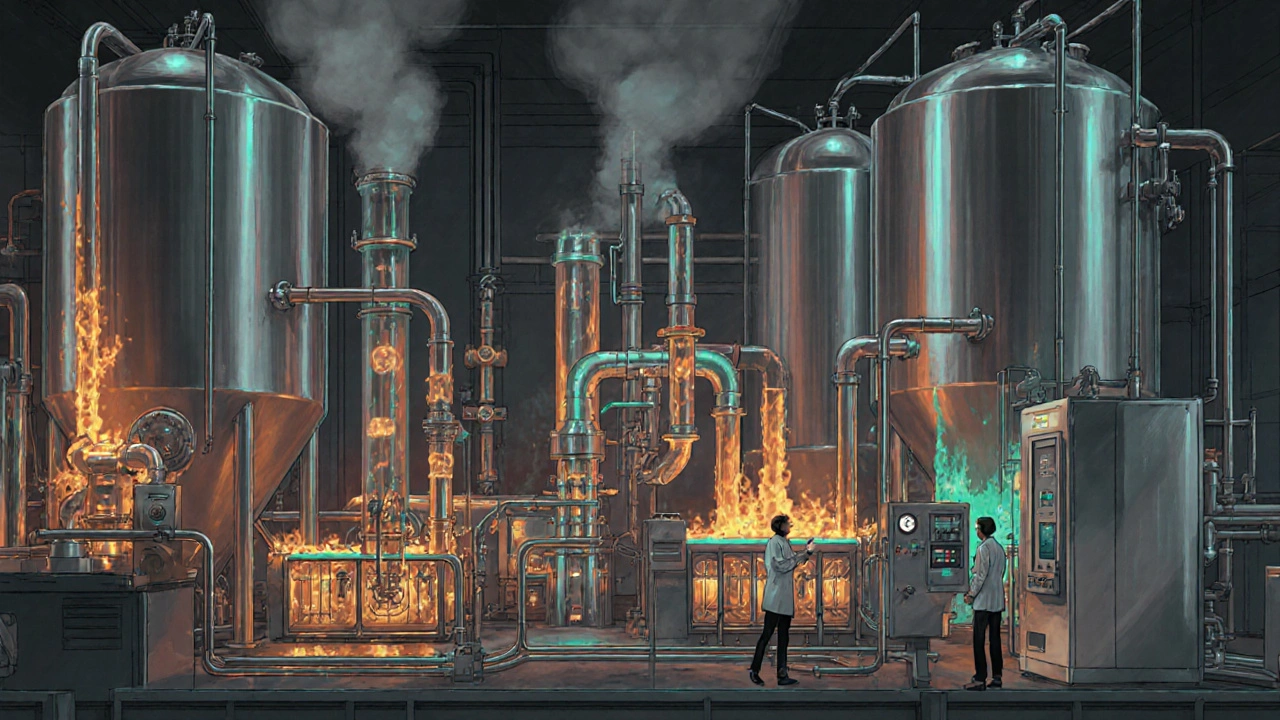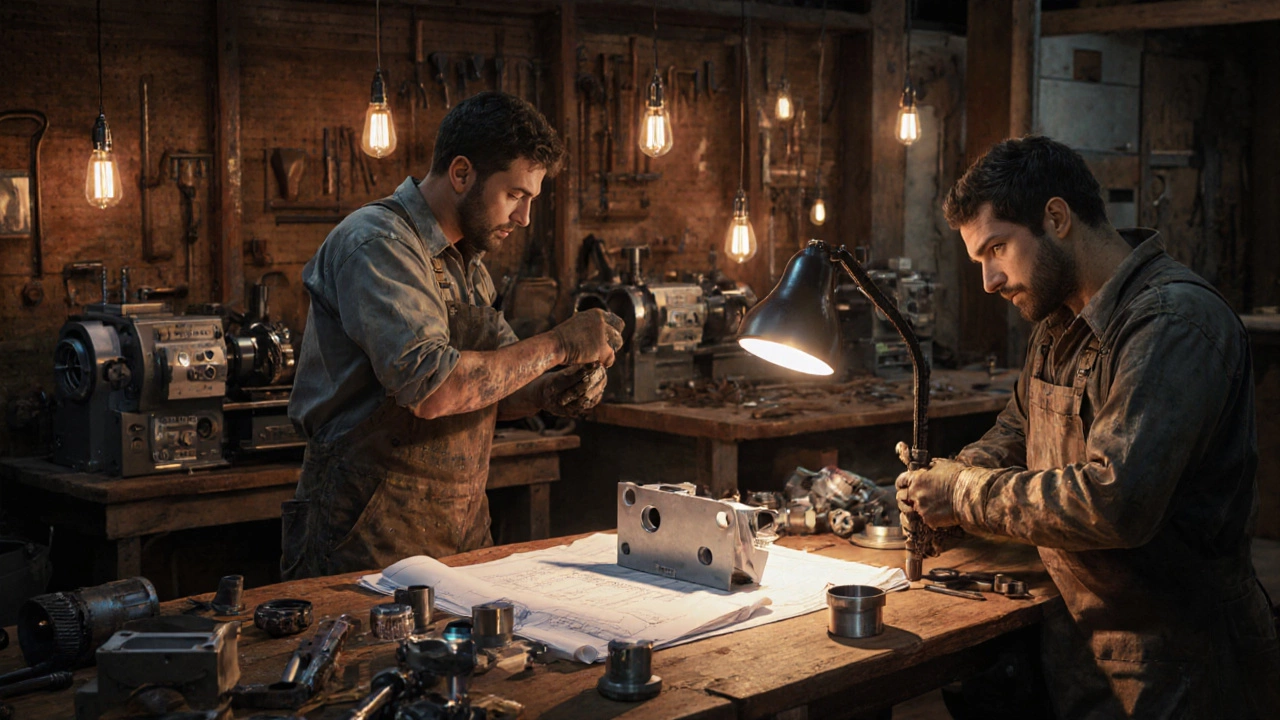Not all manufacturers are the same. If you think making things is just about machines and assembly lines, you’re missing a big part of the picture. The way a company builds its products decides everything - from how much it costs to produce, to how fast it can scale, to who its customers are. There are three main types of manufacturers, and understanding which one fits your business can make the difference between barely breaking even and growing steadily.
Discrete Manufacturer
A discrete manufacturer builds products you can count one by one. Think cars, smartphones, washing machines, or bicycles. Each unit is identical in design but can be tracked individually through production. These companies use assembly lines, robotics, and detailed work orders to put parts together in a specific sequence.
What makes discrete manufacturing unique is traceability. If a batch of airbags fails safety tests, the manufacturer can pull up which cars got them, when they were made, and who assembled them. That’s why companies like Ford, Bosch, and Siemens rely on this model. They don’t just make things - they make things with serial numbers, barcodes, and digital records.
Discrete manufacturers need strong inventory control. You can’t run out of a single screw and stop a whole car line. That’s why ERP systems like SAP or Oracle are common here. The production schedule is tight. One delay in the wheel supplier can hold up 200 vehicles. This model works best when you’re selling high-value, complex products with predictable demand.
Process Manufacturer
If you’ve ever bought milk, shampoo, gasoline, or medicine, you’ve used a product from a process manufacturer. These companies don’t assemble parts - they mix, blend, heat, or chemically transform raw materials into a finished product that flows continuously.
Think of it like baking a cake in a giant industrial oven instead of making cupcakes one at a time. You pour in flour, sugar, eggs, and butter - and out comes batter. Then it’s baked, cooled, and packaged. No individual units. Just batches. A single run might produce 50,000 liters of soda or 2 tons of fertilizer.
Process manufacturing is all about formulas and recipes. If you change the temperature by 2 degrees in a pharmaceutical plant, the whole batch could be ruined. That’s why these companies live by strict quality controls and compliance standards. FDA, ISO, and GMP rules aren’t optional - they’re built into every step.
Companies like Coca-Cola, Dow Chemical, and Pfizer use this model. Their equipment is designed for continuous flow: tanks, pipes, reactors, and bottling lines. You can’t easily switch from making orange juice to apple juice without cleaning everything. That’s why process manufacturers focus on long production runs and high volume. They make money by efficiency, not customization.
Job Shop Manufacturer
Job shop manufacturers are the opposite of mass producers. They don’t make the same thing every day. Instead, they take custom orders - one at a time. Think custom machinery, specialized tools, prototype parts, or bespoke furniture. Each job is different. Each requires its own plan, tools, and materials.
A job shop might spend Monday building a hydraulic press for a local factory, Tuesday machining titanium brackets for an aerospace client, and Wednesday repairing a lost part for a historic train restoration. There’s no assembly line. No fixed schedule. Everything changes.
This model thrives on skilled labor. Machinists, welders, and engineers need to read blueprints, adjust machines on the fly, and solve problems no one’s seen before. Job shops are common in industrial hubs like Birmingham, Sheffield, and Manchester, where small to mid-sized firms serve niche markets.
The downside? Low volume. High overhead. One custom job can take weeks and cost thousands in setup time. But the upside? High margins. Customers pay more because they can’t get it anywhere else. A job shop might only make 50 units a year - but each one could bring in £5,000. That’s why many survive on repeat clients and referrals.
Software helps here too. Job shop owners use shop floor management tools like JobBOSS or IQMS to track time, materials, and deadlines. Without it, chaos takes over. You need to know who’s working on what, when it’s due, and what parts are sitting in the bin.

How to Know Which Type You Are
Most businesses fit clearly into one category - but some blur the lines. A company making custom medical devices might use process methods for sterilizing parts and discrete methods for assembling them. That’s called hybrid manufacturing, and it’s becoming more common.
Here’s how to tell which type you are:
- Can you count your end products one by one? → Discrete manufacturer
- Do you produce in batches using formulas or recipes? → Process manufacturer
- Do you build one-off items based on customer specs? → Job shop manufacturer
If you’re unsure, look at your production schedule. Does it repeat daily? Then you’re likely discrete or process. Does it change every week? You’re probably a job shop.
Knowing your type isn’t just academic. It affects your equipment choices, software needs, staffing, and even how you price your work. A job shop can’t use the same inventory system as a food processor. A process plant doesn’t need to track serial numbers like a carmaker does.
What Happens When You Mix Them Up
I’ve seen too many small manufacturers fail because they tried to run like someone else. A job shop bought an ERP system designed for carmakers. It cost £40,000 and took six months to implement. They couldn’t use 80% of it. They went bankrupt trying to force a square peg into a round hole.
Or a food company tried to switch from batch production to discrete manufacturing - thinking they could sell individual bottles with barcodes. They ended up spending more on labeling than they made on sales.
Matching your business model to your manufacturing type isn’t about being trendy. It’s about survival. The right system reduces waste, cuts downtime, and keeps your team from burning out.

Real-World Examples
- Discrete: Rolls-Royce (aero engines), Dyson (vacuums), John Deere (tractors)
- Process: Unilever (soap and detergent), Nestlé (chocolate), BP (fuel)
- Job Shop: BAE Systems (custom defense parts), local CNC workshops, bespoke toolmakers
These aren’t just big names. They’re examples of how each model scales. Rolls-Royce doesn’t make 10,000 engines a day - but each one costs millions. Unilever makes billions of bars of soap - but each one is identical. A local CNC shop might make 100 unique parts in a month - but each one is tailored to a client’s exact design.
Choosing Your Path
Are you starting a manufacturing business? Don’t pick a model because it sounds impressive. Pick the one that matches your product, your market, and your team’s skills.
If you’re selling to other businesses with custom needs - go job shop. If you’re making a product that millions will buy the same way - go discrete or process. And if you’re unsure? Start small. Test one job. See how long it takes. See what breaks. That’s how you learn your type.
The right manufacturing model doesn’t just make your product. It makes your business sustainable.
What’s the difference between discrete and process manufacturing?
Discrete manufacturing builds individual, countable items like cars or phones, where each unit is assembled from parts. Process manufacturing creates products in bulk using formulas - like soda, medicine, or paint - where you can’t separate the final product into individual units. Discrete focuses on assembly; process focuses on mixing and transformation.
Can a company be both a job shop and a discrete manufacturer?
Yes, but it’s rare and complex. Some companies operate hybrid models - for example, a machine shop that makes custom parts (job shop) and also produces a standard line of brackets (discrete). The key is separating operations. Mixing the two under one system without proper software and processes leads to chaos. Most successful hybrid firms run them as separate departments with different tools and teams.
Which type of manufacturer is easiest to start?
Job shops are often the easiest to start because they require less upfront investment. You don’t need a full assembly line or giant storage tanks. A few machines, skilled workers, and a small workspace can get you going. But they’re harder to scale. Discrete manufacturing needs more capital for equipment and inventory. Process manufacturing requires regulatory approvals and high-volume demand to be profitable.
Why do process manufacturers need strict compliance rules?
Because what they produce is often consumed or used in critical applications - like food, medicine, or chemicals. A tiny error in a pharmaceutical batch can make people sick. A wrong temperature in a chemical reactor can cause an explosion. Regulations like FDA and GMP exist to prevent disasters. Compliance isn’t paperwork - it’s safety.
Is job shop manufacturing still relevant today?
Absolutely. While mass production dominates headlines, job shops are the backbone of innovation. They make prototypes for startups, custom parts for aerospace, repair components for old machinery, and specialized tools for other manufacturers. In the UK, over 15,000 small job shops employ more than 200,000 people. They’re not glamorous, but they’re essential.
Understanding these three types of manufacturers isn’t just for factory owners. It’s for anyone who buys, sells, or depends on manufactured goods. Whether you’re sourcing parts, investing in a company, or starting your own line - knowing how things are made changes how you think about them.






